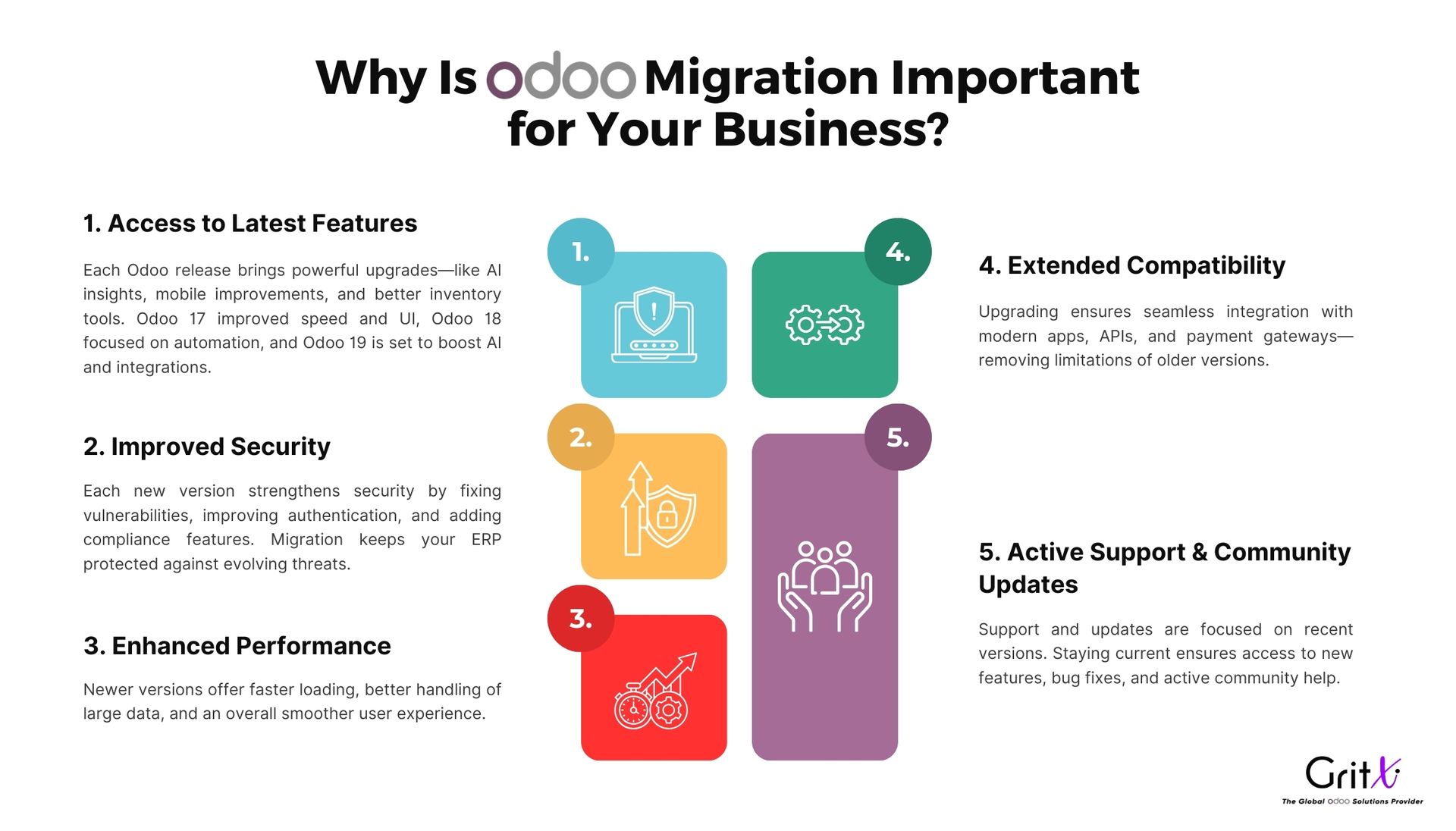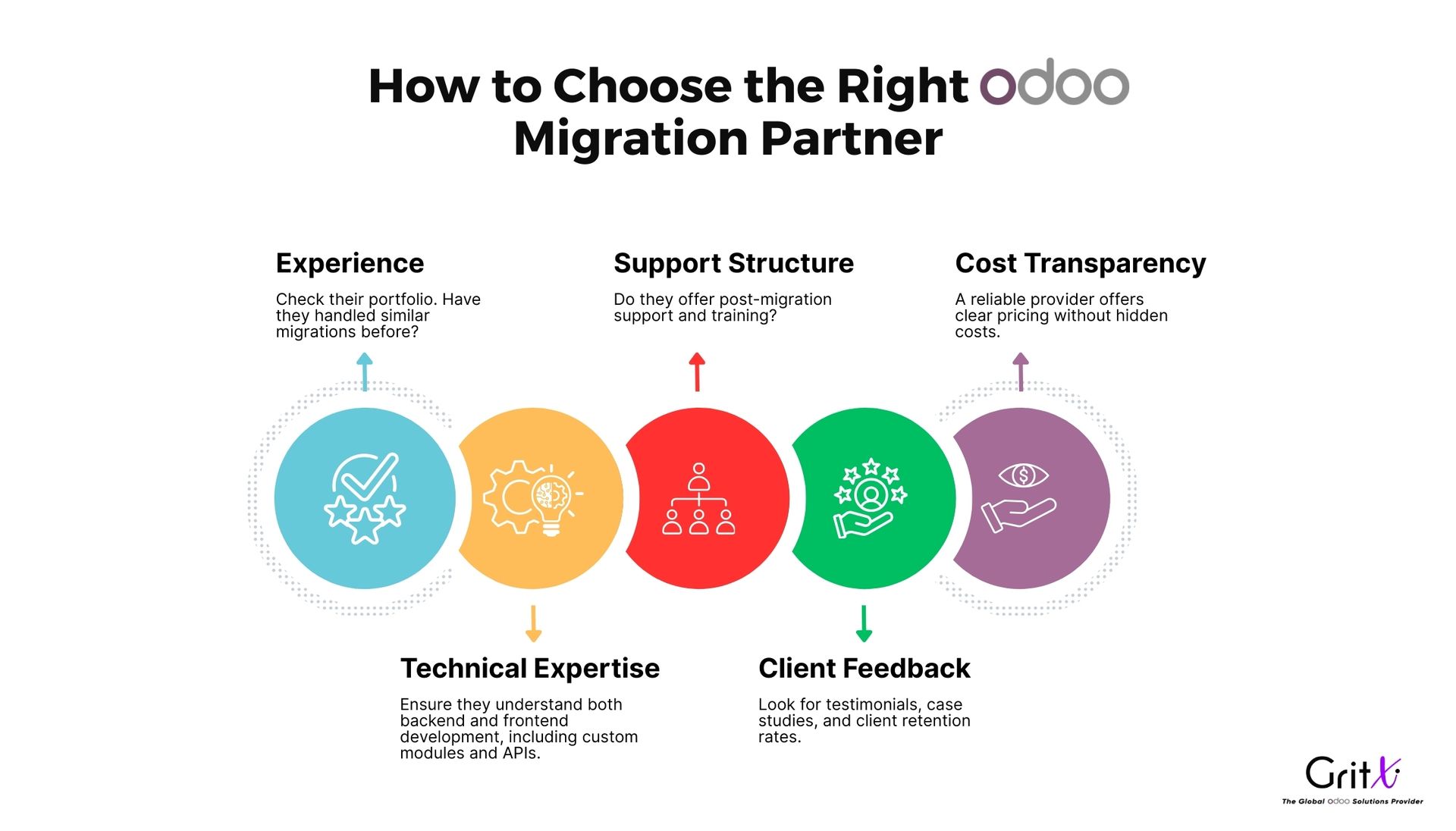In a digital-first business environment, staying competitive often means upgrading the systems and software that power your organization. One such platform that’s helped thousands of businesses streamline operations is Odoo ERP. Its modular structure, customization capabilities, and scalability make it a preferred choice for companies of all sizes.
But just like any evolving technology, Odoo releases frequent updates to enhance performance, security, and usability. If you're still using an older version or struggling with legacy systems, it's time to consider Odoo Migration Services.
In this comprehensive guide, we’ll walk you through what Odoo migration is, why it’s essential, and how it can boost your business operations.
Understanding Odoo Migration Services
What Is Odoo Migration?
Odoo Migration refers to the process of upgrading your existing Odoo system to a newer version or migrating from another ERP to Odoo. The migration involves transferring:
- Your core business data (customers, products, orders, financials, etc.)
- Customized modules and third-party apps
- Workflows, configurations, and user roles
Odoo migration is not just a version update—it is a complex process that ensures your ERP remains up-to-date without data loss, performance issues, or functional errors.
Types of Odoo Migration Services
- Version Migration:
This involves moving from an older Odoo version (e.g., Odoo 13/14/15) to the latest release like Odoo 17, Odoo 18, or the upcoming Odoo 19. Each upgrade comes with performance boosts, UI improvements, and feature enhancements. - Data Migration:
Safely migrating your critical business data without duplication or loss is at the heart of data migration. - Custom Module Migration:
If you've built custom apps or modules tailored to your business processes, these need to be upgraded to remain compatible with the new Odoo version.

Why Is Odoo Migration Important for Your Business?
Sticking to an outdated ERP system might seem harmless in the short term, but it can severely limit your organization’s growth in the long run. Here’s why migrating to the latest Odoo version is a business necessity:
1. Access to Latest Features
Each Odoo release comes with significant enhancements. From AI-powered insights to improved inventory management and better mobile responsiveness, every version brings tools that can add value to your business.
For instance, Odoo 17 introduced an enhanced UI and faster backend, while Odoo 18 focused on intelligent automation. Odoo 19 is expected to push boundaries with AI-driven business tools and better integration support.
2. Improved Security
Cybersecurity threats are constantly evolving. With each new version, Odoo addresses vulnerabilities, improves user authentication, and adds compliance features to meet modern data protection standards. Migration ensures your ERP is safeguarded against current threats.
3. Enhanced Performance
Newer Odoo versions are faster, lighter, and more efficient. Whether it’s loading pages quicker or handling large datasets smoothly, an upgrade can significantly enhance performance and user experience.
4. Extended Compatibility
Odoo updates are designed to integrate smoothly with modern third-party apps, APIs, and payment gateways. Migrating to a newer version ensures you can make use of newer integrations without restrictions.
5. Active Support and Community Updates
Odoo and its community focus support and development on the latest versions. Using older versions means limited support and no access to new features or patches.
What Happens If You Don’t Migrate?
Businesses that delay migration often experience:
- Security Risks: Older versions are more susceptible to cyberattacks.
- Slower Processes: Performance may degrade over time, affecting productivity.
- Incompatibility: New modules or third-party tools may not work with older Odoo versions.
- Increased Maintenance Costs: Fixing bugs or adding features becomes expensive.
- Lack of Support: The Odoo community and official teams focus on newer versions, leaving outdated versions behind.
In short, delaying migration may slow down your digital transformation journey.
How Odoo Migration Services Benefit Your Business
Migrating Odoo is a complex task involving technical expertise, planning, and testing. That’s where professional Odoo Migration Services make a difference.
Key Benefits:
- Error-Free Migration
Professionals ensure that the data is migrated without loss, duplication, or formatting issues. - Minimal Downtime
A good migration partner plans and executes the process in a way that your business operations remain unaffected. - Customized Approach
Every business is unique. Odoo migration experts tailor the process based on your specific modules, customizations, and workflows. - Post-Migration Support
After the system goes live, support teams handle any bugs or optimization needs. - Testing and Quality Assurance
Before going live, everything is thoroughly tested to ensure performance, functionality, and user experience.
The Odoo Migration Process: Step by Step
Understanding the migration process can help you plan better. Here’s how it typically unfolds:
1. Requirement Analysis
The service provider audits your current setup to understand:
- Existing version
- Customizations
- Third-party modules
- Data structure and dependencies
2. Backup and Planning
A complete backup of your data and modules is created. A detailed roadmap is laid out to minimize risks.
3. Code Migration
Modules and customizations are updated or rewritten to be compatible with the new Odoo version.
4. Data Migration
Business-critical data (contacts, sales, invoices, stock, etc.) is transferred to the new version with care.
5. UI and Workflow Adjustments
New UI features and improved workflows are integrated into your current process.
6. Testing and Validation
Extensive QA is conducted to ensure everything works as expected.
7. Go-Live and Training
Once tested, the new system is made live. End-users are trained to adapt to the upgraded version smoothly.
8. Post-Migration Support
Support is available for bug fixing, updates, and minor tweaks after go-live.

How to Choose the Right Odoo Migration Partner
A successful migration depends on the team behind it. Here's what to consider:
Experience
Check their portfolio. Have they handled similar migrations before?
Technical Expertise
Ensure they understand both backend and frontend development, including custom modules and APIs.
Support Structure
Do they offer post-migration support and training?
Client Feedback
Look for testimonials, case studies, and client retention rates.
Cost Transparency
A reliable provider offers clear pricing without hidden costs.
Industries That Benefit from Odoo Migration Services
Odoo serves a wide range of industries, and timely migration benefits all of them:
- eCommerce & Retail: Improve UX, integrate better payment systems
- Manufacturing: Optimize inventory, production planning
- Logistics: Better shipment tracking and vendor management
- Healthcare: Enhanced patient management and scheduling
- Hospitality: Smooth booking and front-desk operations
- Automotive & RV: Track inventory, sales, and custom build options
No matter your domain, Odoo migration ensures you’re running on the most efficient and secure version.
Final Thoughts: Upgrade Your ERP, Empower Your Business
Migrating to the latest version of Odoo is not just a technical upgrade—it’s a business transformation. With new features, better security, and streamlined performance, it opens the door to greater productivity and growth.
If you’re still on an outdated version, now is the time to take action. With the right Odoo Migration Services, your business can stay ahead of the competition, reduce manual processes, and make smarter decisions—faster.
Need Help with Odoo Migration?
Partner with experienced Odoo professionals who understand your business goals. Whether you're upgrading from Odoo 14 or switching from another ERP, we’re here to ensure a seamless and secure migration journey.
Let’s talk. Contact us today for a free consultation!
What Are Odoo Migration Services and Why Does Your Business Need Them?